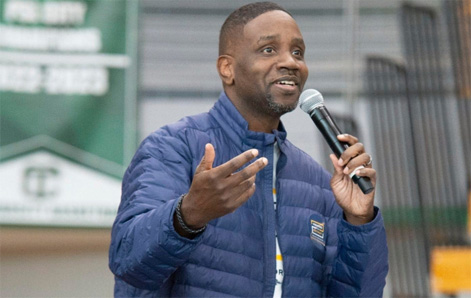|
|
|
|
|
|
 |
|
|
Kinloch,
51,
brings a
different
profile
to the
race.
Since
becoming
senior
pastor
of
Triumph
Church
in 1998
at age
24, he
has
grown
the
congregation
from 44
members
to a
regional
network
of
35,000
members
across
eight
locations
spanning
from
Detroit
to
Flint.
(UAW
Photo) |
|
|
Analysis:
Sheffield
and
Kinloch
Set for
Historic
Showdown
in
Detroit
Mayor's
Race
City
Council
President
faces
megachurch
pastor
in
November
election
that
could
make
history
Wendell
Bryant -
Local/State/Politics
Tell Us
Detroit
News
DETROIT
-
Detroit
City
Council
President
Mary
Sheffield
and
megachurch
pastor
Solomon
Kinloch
will
square
off in
November's
general
election
for
mayor,
setting
up a
contest
between
political
experience
and
community
leadership
that
could
reshape
the
city's
future.
Sheffield
dominated
Tuesday's
primary
with
50.82%
of the
vote,
while
Kinloch
secured
second
place
with
17.37%,
positioning
them as
the
final
two
candidates
to
succeed
three-term
Mayor
Mike
Duggan,
who is
stepping
down to
run for
Michigan
governor
in 2026.
The
matchup
presents
Detroit's
518,000
registered
voters
with a
clear
choice
between
Sheffield's
decade-plus
of
political
experience
and
Kinloch's
track
record
of
community
building
through
his
expansive
church
network.
A
Historic
Opportunity
If
elected,
Sheffield
would
become
Detroit's
first
female
mayor in
the
city's
history.
The
37-year-old
fourth-generation
Detroiter
has
served
on City
Council
since
becoming
the
youngest
person
elected
to the
body at
age 26.
She
currently
serves
as
Council
President
and
chairs
the
Planning
and
Economic
Development
Committee.
"Mary
Sheffield
represents
both
continuity
with the
progress
we've
made and
the
fresh
leadership
Detroit
needs,"
said one
political
observer,
noting
her deep
roots in
the city
and
extensive
policy
experience.
Sheffield's
campaign
has
centered
on
neighborhood
reinvestment,
land
justice,
and
equitable
economic
growth.
She has
also
emphasized
the need
to find
new
revenue
streams
to
replace
potential
federal
funding
cuts,
particularly
for
housing,
public
safety,
and
transit
services.
The
Challenger's
Vision
Kinloch,
51,
brings a
different
profile
to the
race.
Since
becoming
senior
pastor
of
Triumph
Church
in 1998
at age
24, he
has
grown
the
congregation
from 44
members
to a
regional
network
of
35,000
members
across
eight
locations
spanning
from
Detroit
to
Flint.
His
campaign
platform
includes
ambitious
goals:
building
10,000
affordable
housing
units,
establishing
ten new
grocery
stores
to
address
food
deserts,
and
creating
a
training
center
for jobs
paying
$35 per
hour.
"The
central
question
facing
Detroit
is
whether
our
revival
has
become
what we
have
dreamed
and
imagined,"
Kinloch
has
said,
positioning
himself
as the
candidate
to
accelerate
the
city's
recovery.
The Path
Forward
The
primary
results
give
Sheffield
a
significant
advantage
heading
into the
general
election,
with her
more
than
30-point
margin
suggesting
strong
citywide
support.
However,
Kinloch's
extensive
community
connections
through
his
church
network
could
provide
formidable
grassroots
organizing
power.
Both
candidates
will be
competing
to
continue
Detroit's
growth
trajectory
under
Duggan
while
addressing
ongoing
challenges
around
housing
affordability,
economic
development,
and
federal
funding
uncertainties.
The race
represents
a
fundamental
choice
for
Detroit
voters:
institutional
political
experience
versus
community
leadership,
continuity
versus
change,
and
establishment
connections
versus
grassroots
mobilization.
November
Stakes
With
Duggan's
departure,
Detroit
faces a
transition
moment
as the
city
continues
its
recovery
and
seeks to
build on
recent
progress.
The
election
will
determine
who
leads
that
effort
and
whether
Detroit
will
make
history
with its
first
female
mayor.
The
general
election
is
scheduled
for
November
4, 2025.
|
|
|
|
|
|
|
|
|